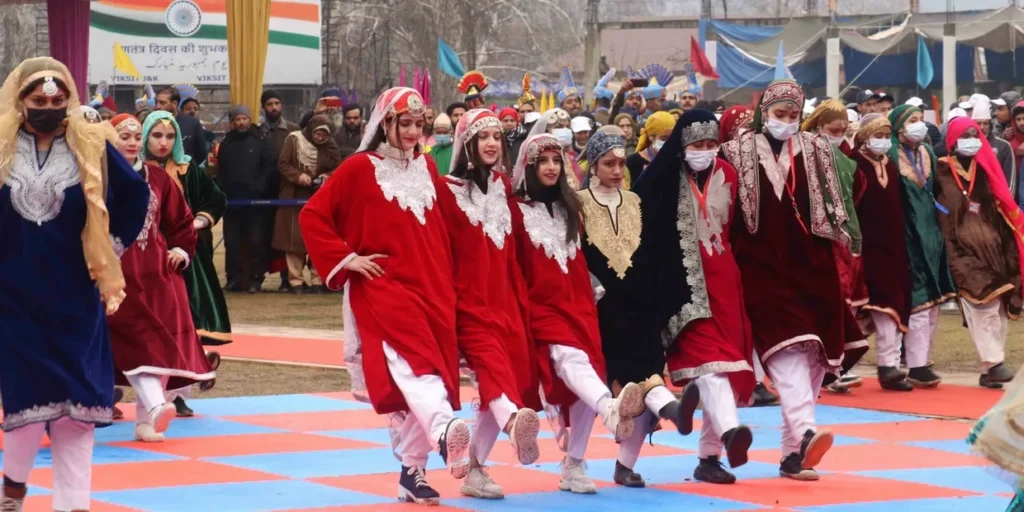Festivals and Celebrations
Kashmiri festivals and celebrations are a vibrant tapestry of cultural diversity, religious significance, and communal harmony that have evolved over centuries in the stunning Himalayan region. These festivities not only mark important religious events but also provide a platform for the people of Kashmir to come together, celebrate their heritage, and strengthen bonds.
Amidst the backdrop of breathtaking landscapes, the Kashmiri people celebrate Eid-ul-Fitr and Eid-ul-Adha with great enthusiasm. Eid-ul-Fitr, also known as “Meethi Eid,” marks the end of Ramadan, the holy month of fasting. It is a time for Muslims to offer special prayers, exchange gifts, and indulge in feasting, including delicious dishes like sheer khurma and seviyan. Eid-ul-Adha, also called the “Festival of Sacrifice,” commemorates the willingness of Ibrahim (Abraham) to sacrifice his son as an act of obedience to God. On this occasion, families come together to sacrifice animals like goats and sheep, with a portion of the meat distributed to the less fortunate.
The Hindu community in Kashmir observes festivals like Diwali and Navratri with equal fervor. Diwali, the Festival of Lights, is celebrated with the lighting of oil lamps, the bursting of fireworks, and the exchange of sweets and gifts. Navratri, a nine-night festival dedicated to the goddess Durga, involves fasting, prayer, and vibrant dances like the Garba and Dandiya Raas.
Shivratri, also known as “Herath” in Kashmir, holds a special place in the hearts of both Hindus and Muslims. This festival commemorates Lord Shiva’s marriage to Parvati and involves night-long prayers at temples and shrines, with devotees singing bhajans (devotional songs) and performing aarti (rituals). Herath serves as a prime example of the syncretic traditions in Kashmir, as both communities come together to celebrate this significant occasion.
Kashmiri Sikhs celebrate festivals like Guru Nanak Jayanti and Baisakhi with devotion and fervor. Guru Nanak Jayanti, marking the birth of Guru Nanak Dev Ji, the founder of Sikhism, is celebrated with prayers, kirtans (hymns), and langar (community meals) at gurdwaras (Sikh temples). Baisakhi, the Sikh New Year, is celebrated with great enthusiasm, with processions, kirtans, and traditional dances.

In addition to these major religious festivals, Kashmiris celebrate other cultural events and fairs that showcase their rich heritage. The annual Tulip Festival, held in Srinagar, attracts tourists and locals alike, offering a breathtaking display of vibrant tulip blossoms. The Jammu and Kashmir Festival, organized by the government, features a range of artistic performances, handicraft exhibitions, and cultural displays.
Weddings in Kashmir are grand affairs and deserve special mention. The traditional Kashmiri wedding, known as “Wazwan,” is an extravagant multi-course feast, featuring an array of mouthwatering dishes that symbolize prosperity and hospitality. These weddings are marked by music, dance, and traditional rituals, with the bride and groom adorned in elaborate attire.
Kashmiri festivals and celebrations are not only a reflection of the region’s cultural diversity but also a testament to the enduring spirit of communal harmony. In a land where various religious communities coexist, these festivals provide a beautiful example of unity, love, and shared traditions, making them an integral part of Kashmir’s cultural mosaic.